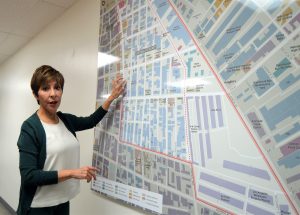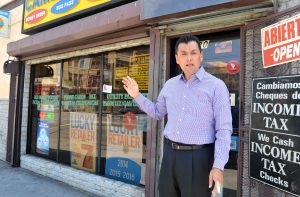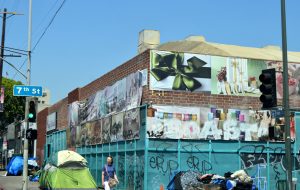By Luis Uribe

Los Angeles, Jun 21 (efe-epa).- The growing number of homeless people sleeping on the streets of Los Angeles has set off alarms to business owners and activists, who day by day see the poor putting up makeshift tents on the streets where they sleep until morning. A significant number of them are Latinos.
According to people consulted by EFE, this situation has reached “critical extremes” over the past two years, ever since the owners of businesses in the Skid Row area of downtown Los Angeles have seen their incomes seriously affected by the problem of homeless people lying around in front of their establishments.
“My family has been on this corner since 1972. I personally have been in the business since 1983, and have seen how the area has changed,” said Sergio Moreno, owner of a check cashing and money transfer store on 7th Street.
Moreno described the situation as a “humanitarian crisis, because we’re seeing diseases that haven’t been seen in the city in hundreds of years.”
Moreno is one of the business owners that through the Los Angeles Downtown Industrial District (Ladid) have begun to undertake street cleaning and safety measures on their own.
The day before Moreno’s interview with EFE, authorities displaced the homeless and took away their tents, but the businessman knows that in two or three days they’ll be back.

“We’ve never felt so desperate as we do these days,” said for her part Ladid’s Executive Director Estela Lopez.
“There’s tremendous tension right now between business owners and the poor, whose numbers have been growing fast since 2006,” Lopez said.
“We have 19 people who were previously destitute and wanted to change their lives. Many were drug addicts and took programs to give up their addiction, and now go to school and work at cleaning the sidewalks every day,” the Ladid executive said.
According to Lopez, this team with its various trucks “picks up between five and seven tons of trash every day from the 46 blocks the make up the district.”
There are also 10 people trained to make up a private security group who patrol the area, usually on bicycles but sometimes in cars.
“Our private security group answers calls from businesses when they’re somehow at risk, like when a beggar tries to steal something or locks himself in a bathroom,” the executive and activist said.
Its response comes “between 30 seconds and 1 minute, something the cops, for lack of personnel, can’t do,” Lopez said.

According to the survey “2019 Greater Los Angeles Homeless Count,” published this month, the number of people sleeping on the streets is up 12 percent over last year due to the scarcity of affordable dwellings.
That survey counted 58,936 homeless compared with 52,765 in 2018.
Hispanics make up 35 percent of the homeless in Los Angeles County, the study says.
In the Los Angeles metropolitan area, the number of businesses with Latino owners represented 26.5 percent of the total, according to a 2018 report by Stanford University.
For Lopez, the “true” solutions can’t be offered in the same streets where she is trying to combat the problem.
We can consider putting bathrooms on every block where the homeless can relieve themselves and bathe, but that’s not a real solution. The solution is to offer them a roof over their heads in a safe place, where they can also get other services like medical attention and rehab,” she said.
“It hurts me deeply to see so many human beings whose lives seem to be worth nothing. That is not consistent with what we believe, which is that everyone is created in the image of God,” Lopez lamented.
The activist said the destitute “are not living but are rather dying on the streets.”
